|
As Lent approaches, an internal monologue begins in my head: “Should I give up coffee? I really love coffee…or maybe I should give up sugar and eat vegetables this Lent?” This typically continues until Ash Wednesday when I sort of pick something that seems to be the most manageable, and also the right type of sacrifice for my spiritual life—a Goldilocks “fits just right” version of Lenten observances. This past Ash Wednesday, I was in the midst of my Lenten debate when Father’s homily quickly brought me out of myself. During his homily, he reminded us that Lent is not for our waistlines, for our piety, nor for our chocolate addiction. Lent is for the faithful to remember that we need God and God alone. The biggest inhibitor to the graces of the Easter season is ignorance of our need for salvation! He reminded us that Good Friday’s action means nothing if we do not remember that we are the ones who put Jesus on the Cross by our propensity to sin. I was sitting in the pew feeling as though the wind had been taken from me; I tend to fall into this forgetfulness. The priest continued to challenge us about Lent by sharing some reflections from G.K. Chesterton’s book What’s Wrong with the World. When asked that question, “what is wrong with the world?” one might say “politics,” “relativism,” “the secular culture,” “sickness,” “a lack of love towards fellow man” etc. But G.K. Chesterton’s main point is that we are what is wrong with the world—each one of us. Not because we are inherently bad or evil, but simply because we are fallen human beings who sin. This sin is what is wrong with the world—sin which we choose to commit and therefore bring into the world every time we choose our own way rather than God’s. Father explained that the only way to truly change the world is by looking at ourselves, our sin, our pride, our judgment, our self-pity, our lack of love for our families, friends, or coworkers, and so on. In reorienting our Lent to admitting that we, with the help of God’s grace, are responsible for the change we wish to see, we become not only responsible for our sin, but admit that we truly need a Savior. Father left the congregation with this quote from What’s Wrong with the World: “The Christian ideal has not been tried and found wanting. It has been found difficult; and left untried.” He encouraged us this Lent to truly try the Christian way of life, starting with radically accepting our need for a Savior! As a result, my Lent has looked different this year. Instead of the usual giving up of sweets or coffee, I am trying to take radical responsibility for the things in my life that I normally would point a finger at or blame others for—the things in my day to day that I want to see changed. The times I would like to say, “if this person would stop doing x,” “if my son would sleep through the night,” “if my husband would unload the dishes” have turned it into prayers for those I need more patience with, the choice of gratitude instead of complaining, and small acts of love for my family. And so, as we continue onward in our Lenten journey, let us remember that our choices to sin are what is wrong with the world and praise God because we have a Savior to Whom we can turn each day. For more resources to accompany you throughout your Lenten journey, please click here.
0 Comments
\We are once again in the midst of the liturgical season of Lent. These forty days before the Triduum are opportunities to prepare ourselves to enter into the Passion of Christ through penitential practices such as prayer, fasting, almsgiving, and self-sacrifice. Done correctly, our Lenten practices can be cathartically cleansing as we imitate Christ’s forty days in the desert after His baptism. This incredible withdrawal of the Lord from the outside world to dwell on the calling of His Heavenly Father before the commencement of earthly ministry remains a model for us all. During Lent, the faithful do not isolate themselves from the world in fear but rather draw strength from Christ. Shaking off the comforts and complacencies of living in the world may be a bit jolting, but our ultimate goal is holiness; anything else is just a noisy distraction which can never truly satisfy our deepest desires. Today, technology has become integrated into our lives and relationships. Social media, the internet, and the incredible utility of our smartphones may occupy a large part of our daily attention. It’s no wonder we can find it harder to disconnect from the outside world. Indeed, while the proper and moderated use of technology can be beneficial, observing the dangers of failing to unplug from the world (i.e., harming real human connections), has helped deepen my appreciation for the isolation opportunities afforded by Lenten observances. Lent calls each of us to remember the ultimate sacrifice God Himself made on Good Friday. This salvific act is so significant that it cannot be restricted to just one day on the liturgical calendar. The Church commemorates Jesus’ Last Supper, Passion, and Death during the Triduum. As these days draw near, the faithful are called to prepare themselves to enter into the Paschal Mystery by putting aside our worldly comforts and imitating how our Lord spent precious time among His disciples before His death. While Lent is an increased time of preparation and time of intentional growth in holiness, the Church has no shortage of opportunities to deepen our relationship with the Lord year-round. Sunday Mass offers us the spiritual nourishment and proper grounding to start each week. The choices we make in the hours or days following Mass can build upon the scriptural and sacramental foundations laid during the service. Recommitting ourselves to our families and their needs can strengthen the love binding us together; praying with and serving each other builds up the domestic church. For example, volunteering to lead devotional prayers together as a couple or family is a beautiful expression of intimacy and faith. Additionally, during Lent and beyond, we may replace screen time with spiritual reading so we can be inspired by the writings of saints or theologians and discover new avenues of holiness for our lives. Certainly, we can sacrifice a worldly comfort during Lent, but we can also perform charitable works and make a difference in the lives of others during this season. Lent is not a diet! Lent is intended to bring us closer to God, Who is found not in the noise of the world, but in the quiet whisperings of an open heart. Prayer enables us to make room in our hearts for Him to dwell in the temples of our bodies and radiate through our lives. We cleanse ourselves of distractions that prevent us from the holiness He calls us to and we commit ourselves to prayer, fasting, and almsgiving. We repent of our sinful shortcomings and avail ourselves of the sacraments of the Church. Our desire to accompany our Lord can be fulfilled by our faithful vigilance in Eucharistic Adoration, especially in the nighttime hours when our “spirit is willing, but the flesh is weak.” Our Lord is present in the Eucharist we receive at Mass, the Sacrament we adore, the family we are a part of, and the people we serve. He is always ready to not just be a relegated part of our lives, but the core of our very being. The season of Lent can serve to motivate us to choose the better part rather than be complacent in the empty comforts of the world. Though we seek isolation from the distractions of the world to accomplish a meaningful and fruitful Lenten observance, we are promised by the Lord God Himself that we never walk alone when he says: “I am with you always, until the end of the age.” For more resources to accompany you throughout your Lenten journey, please click here. “Who did you pick as your confirmation Saint?”
“St. Vincent!” “Oh cool, St. Vincent DePaul, that’s great!” No…not him…St. Vincent Pallotti…” “Who is that?” The name game for saints with common names is a frequent and sometimes frustrating occurrence, as is often the case with St. Vincent Pallotti—my patron, confirmation saint, and friend. Pallotti was many things: the friend of popes and cardinals, confessor of many of the religious in Rome at the various colleges, and great supporter of the laity. Throughout his 55 years of life, Pallotti did everything for the infinite glory of God (infinitam Dei gloriam). His life, message, and charism were life-giving and meaningful while he was alive, as well as today. Many saints can seem out of our reach—St. Joseph of Cupertino is known for flying and St. Padre Pio of Pietrelcina received the stigmata. While there are accounts of St. Vincent Pallotti levitating and bilocating, his life and legacy are not marked solely by these acts of mysticism. One of the main reasons that Pallotti’s example resonates so deeply with me in 2020—170 years after his death—is because of how humble and “normal” his life was. Now, “normal” is quite relative, but in comparison to many well-known saints, Pallotti’s life was normal, even boring. Pallotti’s parents were devout and his love for Christ and the Church was evident from a young age. There are many stories of St. Vincent’s great care for the poor, including a story of him giving away his bed to a beggar. St. Vincent was not a particularly good student as a young boy, and it was not until his mother prayed a novena to the Holy Spirit for his education that Pallotti became a model student. As a priest of the Diocese of Rome, Pallotti spent much of his time hearing confessions. After a cholera epidemic struck Rome in the mid-1800s, Pallotti founded a home for orphaned girls. He set up night schools so that working men could receive an education. He was also a mathematician. In fact, it was in his study of calculus that he came to understand God as Infinite Love. There was no deed too small, no task unworthy of his effort. To the 2020 Catholic Church in the United States, Pallotti’s great interest in collaboration with and co-responsibility of the laity might not seem outrageous, but in the 1830s and 1840s in Rome, it was. Many of Pallotti’s closest collaborators were lay people, one of whom was Blessed Elisabetta Sanna. He also made sure that the various ministries and apostolates that he established involved the laity not just as pawns or placeholders, but as central actors in the life of the Church. St. Vincent Pallotti can teach us so much. He struggled greatly with anger and pride; in this we learn that we are not alone in our personal struggles. He lost many of his siblings when he was young; in this we learn that we are not alone in our loss. He turned people’s attention to God when he distributed pamphlets during the Roman carnival, or when he would drop a reliquary from his sleeve so that the Romans who would come to kiss his hand (as was customary to do to priests at the time) would kiss it instead of him. In this, we learn that we too can persevere when the world around us tells us things that are contrary to what we believe. I learn from St. Vincent Pallotti every day. He is a model for me in perseverance, humility, and devotion to God. When I sin and fall, I remember his personal reminder that he was but “nothingness and sin.” When I look at the apostolic works that I take part in, the ones that are looked down upon or seen as unrealistic, I think back upon Pallotti and the same judgements that many must have made about him. The greatest influence that St. Vincent Pallotti has had on me is the image of God as Infinite Love—that Infinite Love can love me at my best and my worst. The Infinite Love of God is what balances the scale with sin on one side and being the beloved of God on the other; it reminds us who God is in his greatest depth. My life and my faith have been so greatly touched by St. Vincent Pallotti and I am deeply thankful for him. May he continue to intercede for us all and may we, as we undergo our apostolic works, look to him as a mentor, a guide, and a dear friend. St. Vincent Pallotti, pray for us. To learn more about St. Vincent Pallotti, please click here. As Americans gather around the dinner table for the annual Thanksgiving meal, families have the opportunity to recall and be thankful for the blessings in their lives. The true focus of this national occasion is not simply to marvel at the bounty of food upon the table, but to acknowledge the labors and gifts which directly and indirectly impacted one’s quality of life. As Christians, we know that all thanksgiving is oriented towards God as families join hands and bow their heads in prayers of gratitude. Attitudes of gratitude don’t need to be restricted to the fourth Thursday of November, but can be prevalent in our hearts, minds, and daily lives throughout each year.
True expressions of thanksgiving are rooted in the acknowledgement that nothing in this life should be taken for granted. The blessings of life ultimately come from God’s innate goodness, and Scripture details many occasions of gratitude to God that are often accompanied by offering sacrifices or praise. We read in the psalms, “I will praise God’s name in song and glorify him with thanksgiving” (Psalm 69) and “Let us come before him with thanksgiving and extol him with music and song.” (Psalm 95) Thessalonians reminds us to “give thanks in all circumstances” and Ephesians similarly admonishes us to “always giving thanks to God the Father for everything.” Thanksgiving is a fundamental component of a life of faith. Furthermore, the sacrifices God is interested in include the sacrifice of our pride in favor of humility, the sacrifice of personal desires and wants in favor of trust in His will, and the sacrifice of sinful behaviors in favor of living the life of holiness God has desired for us. As Catholics, we are infinitely grateful for the ultimate sacrifice of Christ upon the cross and the means God Himself has instituted for our embrace of the gift of salvation. As such, the highest form of prayer on earth is participation in the Holy Mass and the direct reception of Christ’s body and blood in the Holy Eucharist (which itself means “thanksgiving”). Thanksgiving disposes our hearts to more fully receive Christ and be transformed by His love. By imitating Jesus, who broke bread and gave thanks to His Heavenly Father prior to his Passion, we are given the strength to similarly give thanks in all circumstances and grow more Christ-like as a result. Of the many pieces of spiritual advice I’ve been given by priests, the reminder to grow in gratitude for what God has given me is a constant opportunity to realize my utter dependency on His providence. In gratitude lies true joy. This Thanksgiving, I invite you to celebrate an attitude of gratitude that overflows into the new year and the years to come. It is fitting that as I write this blog in anticipation for National Vocation Awareness Week, the liturgical calendar has us moving through Paul’s letter to the Romans. In this letter, we find Paul emphasizing that we are now entering into a ‘new exodus.’ Just as Israel was liberated from Egyptian slavery, we are now liberated from the slavery of sin. The sacraments of Baptism and the Eucharist are the means by which Catholic Christian believers are joined to the new Exodus. Baptism is prefigured by the Israelites’ passage through the Red Sea, and the Eucharist is prefigured by the manna and the water from the rock in the desert. As we know well, the story does not end at our baptism. Rather, it is there that the story begins. Israel, having escaped from Egyptian slavery, quickly discovered that serving the Lord was even more demanding on the will than serving Pharaoh. In order to reach the Promised Land, the people of Israel had to take a path through a wilderness of trials and temptations. This path required a valiant conquest of all the obstacles of sin that stood in their way. In fact, the difficulty of the journey had some yearning for the days when they were slaves in Egypt. As children of the ‘new exodus’, our vocation in life is to travel through the wilderness of human life. Our exodus differs from the old in some ways, though. Our proclamation of the freedom found in Christ occurs while we travel. Our baptismal vocation calls us to ongoing sanctification, but it also calls us to witness this great exodus from sin and the new freedom in and won by Jesus Christ. We often desire the commitment to this ‘new exodus’ after seeing the commitment of others. This is a point that Fr. Luigi Giussani makes in his book titled, Is it Possible to Live this Way?. Fr. Giussani stresses the necessity of faith by which one encounters Christ indirectly through the witness of another. This witness tugs at our hearts to the point where we have no choice but to respond. Witnesses are therefore crucial to our discovery of this vocation - a vocation to partake in the new exodus. In my own life, my first example of such witnesses began with my parents. They not only gave me life, but they witnessed the faith by making the home a domestic church. Their marriage provided a template for me in my own vocation. They helped me see that the expression of freedom from the tyranny of selfishness comes through a spousal love. This spousal love is not exclusively expressed through the sacrament of matrimony, but it is also expressed through the sacrament of holy orders. As a diocesan priest, my local church in Harrisburg, particularly St. Francis Xavier in Gettysburg, is in a sense my spouse. I could not have such an understanding were it not for the witness of my parents. In addition, every seminarian and newly ordained priest can think of at least one other priest who first witnessed the presence of Christ to them through their own ministerial priesthood. In my case, I watched and learned first from my childhood pastor in New Hampshire, Fr. Marc Montminy. He was, and continues to be, a witness of Jesus Christ and a faithful spouse of the Church. Other priests who have taken on a similar role in my life are Fr. Frank Donio, S.A.C. (the Director of the Catholic Apostolate Center), priests of the Diocese of Harrisburg, faculty priests at Mount St. Mary’s Seminary, and priests elsewhere. As a priest, I seek (despite shortcomings and failures) to always be attentive to this desire - a desire to reach the promised land of eternal life through this new exodus. This is only possible because I have encountered people who not only accompanied me in discovering this desire, but who also witnessed it. This is, in essence, what it means to be a ‘humana viator’ (a wayfaring pilgrim). This is what it means to be an apostle. This is what it means to imitate Jesus Christ, the apostle of the Father. This is what it means to fulfill our baptismal vocation. During this National Vocation Awareness Week, may we be more attentive to this desire. May we recommit ourselves to this new exodus, which we have already begun through our baptism. May we also maintain and express our gratitude for those who have (and continue to) accompany us as witnesses. For more resources on Accompaniment, please click here. For more resources on Vocational Discernment, please click here. “The love of God and our relationship with the living Christ do not hold us back from dreaming; they do not require us to narrow our horizons. On the contrary, that love elevates us, encourages us and inspires us to a better and more beautiful life” (Christus Vivit, 138).
Have you ever experienced the love of Christ in your life? The love of Christ is not something one and done. It is an ongoing experience. Christ is always pouring out his love to us. We are the ones who are challenged to see and believe. The love of Christ comes to us in a particular way through the Sacraments, especially the Eucharist—an intimate encounter with Christ who is truly present. Pope Francis describes this encounter: “Although we are the ones who stand in procession to receive Communion; we approach the altar in a procession to receive communion, in reality it is Christ who comes towards us to assimilate us in him. There is an encounter with Jesus! To nourish oneself of the Eucharist means to allow oneself to be changed by what we receive” (General Audience, March 21, 2018). Christ is the one who is present and he is the one who is changing us in and through our encounter with him in the Eucharist. We can choose not to see his presence, not to enter this experience of encounter, and not to be changed. That is the freedom that we have. It is the freedom to be indifferent to or reject the love of Christ being freely offered to us. When we experience Christ in the Eucharist, the great gift of his love for us, we become more than we are. We are elevated to a greater love of God and neighbor. How do we enter more fully into this encounter with Christ in the Eucharist? As Pope Francis notes, Christ “comes towards us to assimilate us in him.” He is already moving, acting, and assisting us to cooperate with his grace. We are called to prepare ourselves well for this encounter by being forgiven of our sins through the Sacrament of Penance, by preparing for our encounter through prayer, by entering into the worship of the community of faith, and by witnessing the love of Christ in our daily encounters with others. Over time, we will be transformed by Christ toward living a “better and more beautiful life.” May the Charity of Christ urge us on! As a communications manager who handles the social media accounts for my day job, I’ve had to work at and learn how to better manage my time spent on social media. While this technology is an exciting and ever-evolving resource for sharing and obtaining news, I’ve found social media can also drain my energy or keep me from my priorities. Within the last year, I noticed I was spending four or more hours a day on social media and browsing the Internet. I saw my spiritual life was being affected, so during this past Lent, I decided to do something about that imbalance. I knew I still needed social media for work use, and I discovered a solution. By implementing the screen time and do-not-disturb settings on my phone, I found I could limit my social media consumption to an hour per day. Whatever time was left after work allocations I could spend on personal social media time. Most days I used 45 minutes or the whole hour for work. I came to appreciate that my time was spent elsewhere in a more productive manner. I used the time for additional prayer, reading, church, conversations with friends, and other enjoyable activities. My brain didn’t feel as fuzzy and scattered with random bits of information that would send me off the paths toward my personal, professional, and spiritual goals. After Lent, I took off the screen time and do-not-disturb parameters on my phone due to an evening work event. Since then, I’ve turned them back on. This experience of self-reflection and adjustment of my behaviors reminded me of why God provides us with commandments: to set us free from sin in order to allow us to become more perfectly the people he created us to be. By growing in self-awareness and setting self-imposed boundaries, we can better harness social media for the good. Here are a few questions to consider that I have found help me when evaluating my time spent on social media: (1)Are you present to those around you? People using their digital devices when in the company of others is a growing trend – and a sad one at that. Instead, we should put away our devices and give our attention and time to those in front of us. Being fully present to those we are spending time with in-person shows that we are investing in our relationships and affirming their humanity. By being present to those around us, we respect them and uphold their dignity. (2)Do you let social media distract you from God and others in your life? Have you formed the habit of checking your phone every couple of minutes or felt the non-existent buzz of a notification? Have you moved to autopilot looking through your social media feeds or gone down the rabbit hole of an internet or video search only to see that one, three, or more hours have gone by? This reliance on our phones provides great distraction in our lives, making us susceptible to temptation. We should work to embrace silence with ourselves and with God. By scheduling solitude with God in prayer or time for ourselves to be constructive, we come to know God’s path for us and how he calls us to give of ourselves to others in love. (3)Ask yourself, “Do you really need to share this moment?” With 24/7 access to an inside look at our life’s daily moments through social media, we seem to have lost a sense of privacy and humility. Before posting content to social media, consider the discretion of the moment. Check with family, friends, and significant others if something including them is appropriate to post. Respect their space and yours. Ask yourself why you’re posting the content you want to share and check your motivations. (4)Do you view social media as an outlet that steals your happiness or as a way to share your joy? There is much truth to the adage, “Comparison is the thief of joy.” Comparing ourselves, our possessions, our appearance, our jobs, our wealth, and our relationships to those of others prohibits us from feeling gratitude for our blessings and can derail us from our personal goals. Thanking God for at least one thing a day can help cultivate a spirit of joyfulness, allowing us to celebrate, learn from, and be happy for others around us. (5)Do you feel isolated when spending time on social media? Social media can be a great way to connect with Catholic communities. Personally, I enjoy the discussions and fellowship that Facebook groups cultivate. However, we must be cautious of the temptations to become a technology hermit, as Pope Francis warns of in his 2019 World Day of Social Communications message, or posting “for the sake of Instagram” or self-interested comments. (6)How do you treat others on social media? What we say on social media and Internet comment sections matters. Pope Francis encourages Catholics to live out the faith through social networks as the Body of Christ, welcoming others. As the United States Council of Catholic Bishops’ social media guidelines, we as the Church “can use social media to encourage, respect, dialogue, and [cultivate] honest relationships – in other words, ‘true friendship.’” By living out our faith through the example we set in loving others on social media through our posts and comments, we reveal Christ. The beginning of summer is an exciting time. The school year may be done, and more leisurely activities may be planned, but for the ministry of a local church, the work never stops. The sacraments must be administered, the Holy Mass must be celebrated, the sick and dying must be cared for, and those with life’s burdens and clouds of uncertainty must be consoled: the sacred works of ministry never cease. As even our Lord observed, “The harvest is abundant but the laborers are few; so ask the master of the harvest to send out laborers for his harvest.” God calls upon certain men to embrace a unique vocation of humble sanctity, service, and obedience as priests. As such, seeing the result of years—even decades—of discernment and spiritual formation come to fruition is a cause of immense jubilation for a local church. Ordination day, then, gathers the diocese to happily witness the sacred rite through which the bishop consecrates these men into priestly service. And how wonderful such an occasion is— especially for those who have walked with these men—as new spiritual life is breathed into the church.
While recent scandals might cause some to worry or be wary, the celebration of priestly ordination serves as a reminder that God remains with us and never ceases in caring for the needs of his Church. The sinful actions of a few do not negate the sanctity and solemnity of a call to holy priesthood; the standard remains high even though some have acted beneath it. The saying “God is good, all the time; all the time, God is good” serves as a simple but handy reminder of His faithfulness, which is manifested in the ongoing call for certain men to care for the immense needs of His people. As Cardinal Timothy Dolan of New York observed: Is that not good news? Aren’t you tired of hearing about priests who are trouble? Aren’t you fatigued about hearing of priests in scandals? Aren’t you kind of weary [hearing] about priests that have been removed? Don’t you get a little discouraged when you hear about the vocation crisis? Now, all of those are realities; we don’t need to run from them, but I don’t know about you, but I see six new priests who are enthusiastic and eager and raring to go. That gives me a lot of hope and a lot of encouragement. And it’s going to be a high honor for me to ordain them. Discerning how to answer God’s calling to a vocation in your life is an ongoing process, but this does not mean you need to wrestle with it alone. The Church has a wealth of resources to aid in beginning to answer the questions regarding vocational discernment. Spiritual direction is a common method—whether in person or through a treasure trove of books and reflections which have been produced through the centuries and for a Church which has faced a whole spectrum of challenges and threats. God remains with us through it all! Other means of discernment include retreats and talks offered by dioceses and religious communities. And this is also true for those who may be discerning marriage as a vocation. In Holy Scripture, priesthood can be traced back to the Levite tribe of the Israelites, but the family unit is often modeled after the Holy Family, the highest ideal. No matter what your calling in life, God has sanctified it and calls us all to best apply our lives to the service of others through our vocation. Just as the United States has recently commemorated Memorial Day and the countless who have died answering the call to fight for and defend our rights and freedoms, we as a church can come together to appreciate and love our priests, who live to serve the Body of Christ. They have heard and answered the call of the Most High God and trusted in Him to illuminate the path they have been destined to follow in service. They walk with us in faith to celebrate the sacramental life of the Church and comfort those who seek consolation and peace. In supporting our priests and religious—who can be found in parishes, hospitals, cemeteries, battlefields, and schools—we can celebrate with them as their numbers increase during ordinations so as to aid in the beautiful works of holy ministry. For more resources on Vocational Discernment, please click here. . When I was younger, I often found myself scandalized by the actions of other people. I grew up with a very legalistic morality which sees rules and laws as black and white imperatives. On the one hand, there is a benefit to seeing the value of rules and laws which—when just—help to guide society in the right direction. On the other hand, a legalistic morality fails to see others with eyes of compassion and mercy, the same eyes through which Christ sees humanity and through which he asks us to see as well. When we see people as a compilation of their successes and failures, we do not see the whole person and only focus on what they have done or failed to do. This mindset was often exemplified by the Pharisees who clashed with Christ, as demonstrated in the story of the woman caught in adultery. When the Pharisees brought this woman before Jesus, they did not expect him to respond with compassion. In this passage, the Pharisees and scribes remind him that the law of Moses commands her to be stoned. In response, “Jesus bent down and began to write on the ground with his finger,” and said, “Let the one among you who is without sin be the first to throw a stone at her” (John 8:1-11). Christ reminds us to see with eyes of compassion, but also provides a mirror with which to examine ourselves and our own sin. This is not the only time that Jesus presents us with this challenge. In the Gospel of Matthew, he says, “How can you say to your brother, ‘Let me remove that splinter from your eye,’ while the wooden beam is in your eye? You hypocrite, remove the wooden beam from your eye first; then you will see clearly to remove the splinter from your brother’s eye.” In both cases, Jesus invites those listening to a profound self-examination that leads to conversion rather than self-righteous judgment. In the story of the adulterous woman, we learn that Christ does not allow us to continue wandering aimlessly in our sin but gives us a new directive: “go and sin no more.” The eyes of compassion with which God sees us, and through which we are called to see others, are not blind. Compassion does not mean that we can do whatever we want even if it is detrimental to ourselves, others, or our relationship with God. What God is asking of us is a contrite heart that continually returns to his infinite love. When we sin, we separate ourselves from our neighbor, from God, and from the depths of his infinite love. When Christ says to sin no more, as he did to the woman caught in adultery, he is also telling us to love more fully. To see with eyes of compassion sees this reality and doesn’t mistake our sin as simply breaking a rule. Eyes of compassion allow us to walk with the other person and be walked with ourselves in order to overcome the sins that weigh us down. Today, let’s choose to look with the eyes of compassion and mercy as we strive to follow Christ’s call to “go and sin no more.” The Gospel reading for the Fifth Sunday of Lent is the familiar passage of the adulterous woman and her accusers. For as long as I can remember, this story has been bittersweet: it involves targeted harassment and shame, but also redemption and conversion. At this point in Lent, I don’t think there is a more needed, or relatable, lesson for us to be reminded of and to work on accepting. So, we’re five weeks into our Lenten journey. We’ve been skipping meat on Fridays and trying to live without whatever convenience or vice we decided to give up or purge from ourselves. Maybe we’re praying a little more than we normally would or are setting aside a few minutes to read a daily reflection from those little black books left in the back of our churches. But even with all of these intentional and humbling acts and motivations, we often still feel unworthy or like we’re faltering. Because of this, it’s possible to say that we don’t even need the Pharisees to judge us and bring us for judgement before God – we’re doing it enough for ourselves. To overcome this, I want us to reflect on three things: personal attitude, an open heart, and recognizing what’s in front of us. I think sometimes we’re too hard on ourselves. We allow our own harsh judgements to replace the only one that truly matters: God’s. Our own personal attitude can prevent us from accepting and sharing in the love and grace of God if we constantly feel that we are unworthy or failing. In the Gospel, when the adulterous woman is brought before Jesus, it does not say that she cried or tried to run. In the Gospel account, she lays at the feet of Jesus, lets Him clear her name and, ultimately, lets Him forgive her sins. Here’s a secret I’ve learned that the Gospel has been trying to tell us for a few thousand years now: Man is never worthy on his own, but has been made so by Christ, who offers redemption to all. If man were worthy, Christ would not have needed to redeem us after the Fall. So, we need to stop allowing our own negative perception of our efforts to prevent us from bearing or receiving the fruits of God’s grace and forgiveness. Why was Jesus’ reaction effective with the woman? Christ did not condone her sin, but met the woman in her sinful situation with love and mercy. Surely, such a transformation is not possible without a profound encounter with God’s mercy, an openness to change, and conversion of heart. The adulterous woman of this week’s Gospel is told by Jesus to “Go, and from now on do not sin any more” (John 8:11). As a result of her encounter with Jesus, her heart was changed, and she spent the rest of her life trying to grow closer to Him. We are called to do the same – during the Lenten season or any other time. If we are open to the love of God, it will fill us and strengthen us in our actions. With a faithful attitude and a heart that is open to change, all that is left is for us to encounter God. In order to do this, we must recognize what is in front of us. In the challenges, relationships, beauty of nature, art, and moments of prayer, God is entirely present and inviting us to share in it with Him. What a beautiful gift, and how accessible and truly joyful this is for us! I want to suggest that each of us take a few moments each day this week to reflect on how we’ve gone out of ourselves to be with or grow closer to God. Instead of grumbling about how much we miss Netflix or those amazing chocolate caramels, be proud of yourself for being so committed to your solidarity with Christ and His own suffering. Or, if you tripped up, instead of getting frustrated with yourself, reflect on the three Stations of the Cross in which Jesus falls. Absolute perfection is never what God expects or even desires – He’s just pleased to recognize a desire in us to do better. For more resources to accompany you along your Lenten journey, please click here. Question for Reflection: How can you grow closer to God in the final days of the Lenten season? “Remember you are dust and to dust you shall return.” We are now over a week into our Lenten journey; the reality has set in. We are questioning our decisions to give up sweets or the snooze button, and we are tired. Perhaps we have even failed a few times. The forty days seem to drag, and the somberness of the liturgical season has made itself known. Yet during the Ash Wednesday service at my parish, our priest was talking about the joy of the season and how our failures are meant to bring us closer to Our Lord. In a word, he talked about the hope of Lent. As someone who would rather stay in the joy and light of the Christmas season, I was really challenged by Father’s perspective, especially now, after my many failed attempts to give up the snooze button. We often focus so much on the “giving up” aspect of Lent that the words joy and hope do not seem to go hand in hand with this season. This is especially true when I think of the phrase that kickstarts our Lenten journey: “Remember you are dust and to dust you shall return.” On a superficial level, this sign on our forehead doesn’t look so good. Where are the hope and joy in having ashes smeared on your forehead? Throughout his homily, Father also encouraged us to change our perspective on the difficult acts of penance we are attempting and instead to live in the reality that this season could be a time of true conversion of heart. Our Lord desires us to be holy! The acts of penance we choose could be the very means He uses to break us of habitual sin and to bring a deeper level of charity into our hearts. Conversion of heart and holiness? I could get behind that; I can see the joy there! The priest did not say “if you fail your resolutions” but “when you fail.” This is a reminder of our weakness and utter dependence on Jesus, who will be making His way to Calvary soon, in Scripture, to save our souls. This dependence on Him will assist in our conversion of heart, considering “we can do nothing without him” (John 15:5). So: it’s alright to fail, but run back to Him. Beg Him for more grace! Now let’s read this sentence from the Ash Wednesday service one more time: “Remember you are dust and to dust you shall return.” Where is the hope there? Father explained that this is the most hopeful reality yet. Ultimately this reminder of our sinfulness and our death paradoxically represents the life we have in Christ, the Resurrection of Jesus, and the hope we have of entering into the Eternal Reward. Even though the phrase seems bleak, it can propel our hope throughout these 40 days. We have something to strive for, to live for, and to love for. Though I have failed at my Lenten resolutions more times than I have not, I pray with the hope that my humanity might be resurrected, that Our Lord may convert my sinful ways, and that I may remember that this liturgical season is less about what I do and more about what the Lord is doing in my heart to get me home. What are ways you need to be renewed in hope and joy? How can you accept the failures that come with penance and run to Jesus this Lenten season? “Remember you are dust and to dust you shall return.” For more resources to accompany you on your Lenten journey, please click here. The next forty days of Lent are Mother Church’s annual call to intense prayer, fasting, and almsgiving oriented towards embracing God as the center of one’s life and repenting of all which distracts us from Him. With the current crisis for the Church in the United States, it seems that the Church could really use a good spiritual renewal, cleansing, and renunciation of sin often focused on during the season of Lent. As parts of the Body of Christ[1], we are all too aware how an affliction experienced (or caused) by one part affects us all. Recall the words of St. Paul, “Rejoice with those who rejoice, weep with those who weep... Do not be conquered by evil but conquer evil with good.”[2] The Church is suffering but, just as she always has, she will ultimately be restored for the glory of God. As laity, you and I are key to addressing this scourge, along with the Church’s holy clergy and religious, and to affirming God’s presence in our lives not just in the Lenten season, but every day.
Though a time of repentance, Lent is not a time of despair or hopeless suffering; this season reminds us that God, although saddened by our repeated failings, never closes Himself off from offering mercy and love to the broken, the sinner, and the lost. Lent is not a diet, nor a fad of living without something trivial, nor even a temporary spiritual renewal; it must take root—free from the sin which prevents this—and be nourished over the coming weeks to strengthen us throughout the whole year. Above all, Lent prepares us for the celebration of Easter. Christ has died, Christ is risen, Christ will come again; the Church suffers, the Church is renewed, the Church shall be restored! The abuse scandal today may cause people to feel abandoned, angry, confused, and sad. “How can this be happening?” is certainly a question in our hearts and homes these days. It is important to remember that Jesus Christ, the same “yesterday, today, and forever,”[3] reigns over the Church. He is omnipotent, divinely good, and eternal; Let us take courage in the truth that our faith is ultimately in Jesus Christ. Because our Lord remains faithful to us[4] and ever close to His bride, the Church, He gives us the strength to recommit ourselves to renouncing the evil in our sight that threatens to drive us away from God and His Church. Lent is the perfect opportunity to facilitate spiritual renewal, not only for ourselves but also for the greater Church. Following the example of Jesus’ time in the desert before commencing His public ministry, the faithful are invited to reflect on the state of the Church, pray for strength, courage, justice, and healing, and even seek accountability in the governance of the Church. Personal penance can be made for our own failings, but reparation must also be made to address this scandal and to unify God’s people to prayerful and peaceful action in seeking God’s healing grace to move forward. Over the next 40 days, let us care for the Church by promoting healing among ourselves, supporting the afflicted and needy, addressing sin and divisions, and always proclaiming Christ to each other and the world. For more resources to accompany you throughout the Lenten season, please click here. [1] cf. Lumen Gentium, 33. [2] Romans 12:15, 21. [3] Hebrews 13:8. [4] cf. 2 Timothy 2:13. Just down the street from where I study and serve in my home Archdiocese of Baltimore is our nation’s first Catholic cathedral, the Basilica of the Assumption, a visible testimony to the faith of the first Catholics in the newly formed United States of America. Yet every time I visit that holy place, I’m reminded by the physical space that for many years worship was segregated and black Catholics were required to sit in the balcony. Our family of faith in Baltimore included heroic individuals and communities like that of Mother Mary Lange (1794-1882), founder of the first African-American religious order, the Oblate Sisters of Providence, and the ministry of the Josephites. Their creative witness and ongoing presence in our communities today serve as a constant reminder that their mission lives on and has work yet to do. Since 1990, the Church in the United States, through the work of the National Black Catholic Clergy Caucus (NBCCC), has designated November as Black Catholic History Month. In a special way, the testimony of black Catholics reminds us all that as disciples of Christ, we live by memory. Celebrating this month reminds the Church just what it is that we are responsible for remembering. The act of remembering is a moral and spiritual task, part of the Church’s call to combat the sin of racism and seek new forms of reconciliation with sins of the past. Additionally, I’d like to suggest that memory lies at the heart of the Church’s celebration of word and sacrament, and briefly reflect here on why remembering our Church’s black history is so important for faithfully celebrating God’s word and sacrament each and every day. Those who attend or have attended a parish with a strong black Catholic presence will often recognize the power of the proclamation and preaching of God’s word. In particular, this tradition of preaching reminds Catholics that our Church preaches and teaches a truly liberatory word. Jesus Christ came to deliver God’s people from all forms of bondage and oppression, restoring us to freedom. Our biblical faith makes clear that participation in the Exodus event is intrinsically connected with our participation in the Passover. As Catholics, this means we are fed by God’s word and sacrament, particularly the Eucharist. At the Institution of the Eucharist at his Last Supper, Jesus instructed his Apostles to “Do this in memory of me” (Lk 22:19). The sacrifice of the Mass is an act of remembrance, called anamnesis, that re-presents Christ, making Jesus truly present here and now in the species of bread and wine. (I invite you to read Father Raniero Cantalamessa’s reflection.) That act of remembering is the basis for our act of thanksgiving (literally, “eucharist”). But it is impossible for us to give thanks for what we cannot remember. Does Christ’s presence at the altar then lead us onward to become more aware of Christ’s presence in our brothers and sisters who remain subject to forms of injustice and oppression elsewhere? To this end, our bishops offer resources on how to respond to sins of racism, an important way to publicly live out the interior transformation we receive in the Eucharist. While we live by memory, we do not simply live in the past; we are called to faithfully live out of our past. We live by memory as a sign of our hope that since God gave us a past, he promises us a future. Black Catholic History Month serves as a reminder that we have a history worth remembering and celebrating, so that we may go on living in the freedom to which Christ daily calls us. For more resources, we invite you to visit our Cultural Diversity Resources page and scroll down to the section on African American/Black Catholics. Click here to read Open Wide Our Hearts: The Enduring Call to Love, a pastoral letter from the USCCB against racism Questions for Reflection: How does remembering the past help us to live more faithfully and hopefully in the future? How have you seen our Church benefit from the diversity of its members? *This post was originally published on the Ad Infinitum Blog on November 2, 2017 For more information about Black Catholics in the US, check out the resources created by the National Black Catholic Congress in collaboration with the Catholic Apostolate Center: “She stood behind him at his feet weeping and began to bathe his feet with her tears. Then she wiped them with her hair, kissed them, and anointed them with the ointment.” -Luke 7:38 My toddler is a prime example of living in freedom. He has no true concept of time and goes about his day living in the present. With only two years under his stretchy pants, he has yet to master social norms and polite behavior. He exhibits raw emotion. Because of this, you’ll hear him scream in a store for no reason, make demands at the dinner table, or wail because it’s time for bed. You’ll also hear his gasp when he sees an airplane or helicopter, a “wow” uttered upon seeing the zebra at the zoo, or uncontrolled giggles when he is playing hide and seek. He lives unfiltered, without a second thought regarding how he is received or perceived. It’s a beautiful and awe-inspiring freedom. The woman in the Gospel today lives this to a certain degree. She enters the well-furnished room but does not look about. She smells the aroma of delicious food but does not salivate. She comes solely for Christ, to receive the life he has to offer. Her gaze cast downward, she finds his feet and drops to her knees—uncontrolled tears splashing from her eyes, bathing his feet and forming a puddle on the ground. She does not care about her reputation or what others might think of her actions. She knows her identity: a sinner in need of forgiveness. And she runs to Christ, the well of salvation. The sinner bathes the sinless with her tears, and she is saved. The Church today can learn much from this Gospel passage. We are hurting, broken, and sinful. We do not have to experience crisis to make this statement true, though in times of darkness it becomes more apparent. We debilitate the Body of Christ every time we choose to sin. How do we respond to sin, our own and that of others? Are we humble and repentant? Are we paralyzed? Are we angry? Do we despair? Do we drop to his feet in the Sacrament of Reconciliation or have we scoffed like the Pharisees? In times of darkness, where do we turn? I believe we have a lot to learn from the sinful woman. She does not compare her sins to those of the Pharisees dining with Christ. She does not stay in her home, paralyzed by her sin and her grief. She does not continue to live her day to day life while telling herself that her sin is personal and private. And she does not wait outside the dinner party for Jesus to finish his evening. As my toddler would, she barges in, without any nods to social norms, and goes straight to our Lord. When she is convicted, she runs to seek redemption. She acts. She loves. She repents. And this child-like faith, Jesus says, is what saves her. As we, the Church, move forward in grappling with our sinfulness, let us respond by running to the feet of Christ in humble repentance and by daring to believe in the freedom that he offers. Only he can heal us from within and transform our sinfulness into glory. Let us show Christ great love in our words and deeds: through prayer, through the sacraments, through acts of charity. Let us live in the freedom of his words: “Your faith has saved you; go in peace.” In Matthew’s gospel, chapter 16, Jesus asks his disciples, “Who do people say that the Son of Man is?” The disciples reply that some say John the Baptist, Elijah, Jeremiah, or another prophet. When Christ presses them further, “But who do you say that I am?” Simon Peter steps forward and answers, “You are the Christ, the Son of the living God.” Christ, responds:
“Blessed are you, Simon son of Jonah. For flesh and blood has not revealed this to you, by my heavenly Father. And so I say to you, you are Peter, and upon this rock I build my Church.” As Simon names Christ, Christ renames Simon. Simon’s recognition of Christ’s identity merits him a new identity, both by name, and by acceptance into God’s family. Simon, once son of Jonah, becomes Peter, child of God, disciple of Christ, the rock of the Church. Our Christianity—our proclamation that Jesus Christ is Lord—brings forth a new identity in all of us. The process first begins at baptism. On our behalf, our parents and godparents echo the sentiments of Peter through a profession of faith while the priest, describes our new identities through the words of the baptismal rite (emphases mine):
“You have become a new creation, and have clothed yourself in Christ. See in this white garment the outward sign of your Christian dignity. With your family and friends to help you by word and example, bring that dignity unstained into the everlasting life of heaven.” Not only does the baptismal garment symbolize the state of our souls, freed from original sin, but it also reflects on the nature of clothing as a sign of identity. A priest in his collar, an athlete in his uniform, a mother with a diaper bag slung over her shoulder - what we put on our bodies says something about who we are. During our baptism, we are clothed with Christ - the pure and spotless victim, symbolized by a pure and spotless garment. The white of our baptismal garments also represents the invitation of Christ to all people, regardless of race, ethnicity, social status, or gender. Despite the divisions we impose on one another through our many secondary identities, Christ makes no distinctions among the members of his Father’s house. As St. Paul says in his letter to the Galatians: “For all of you who were baptized into Christ have clothed yourselves with Christ. There is neither Jew nor Greek, there is neither slave nor free person, there is not male and female; for you are all one in Christ Jesus.” Our primary identity in Christ is universal and unified. So, what does our identity in Christ mean for us in the day to day? The baptismal rite covers that too. “With your family and friends to help you by word and example, bring that [Christian] dignity unstained into the everlasting life of heaven.” St. James puts it a slightly different way: “Be doers of the word and not hearers only, deluding yourselves. Religion that is pure and undefiled before God and the Father is this: to care for orphans and widows in their affliction and to keep oneself unstained by the world.” To the best of our abilities, as members of God’s family we must do two things: care and keep. Care: Be a doer of the word! Who needs your help? Ask God to show you who the orphans and widows are in your life, i.e., who needs you to provide something for them, whether it is material, emotional, or spiritual support. At some point, YOU will be a widow or orphan for someone else. When that time comes, ask God for the humility to accept help. Keep: Keep spotless your baptismal garment! Avoid the near occasion of sin, and when you don’t, repent and start over. Go to confession, receive the Eucharist, and spend as much time as you can in prayer. Grow close to Christ through your own sanctification. These directives from the baptismal rite and St. James depend on one another. The closer you are to Christ, the more you will serve his people. The more you serve his people, the closer you are to Christ. Notice that the baptismal rite specifies that you need the help of your “family and friends” to maintain your Christian dignity. You’re not in this alone. You have an entire community of believers behind you. Let’s be doers of the word together. |
Details
Archives
July 2024
Categories
All
|
About |
Media |
© COPYRIGHT 2024 | ALL RIGHTS RESERVED






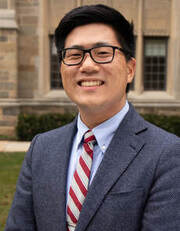


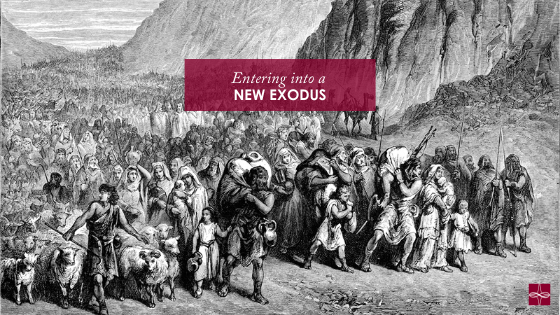

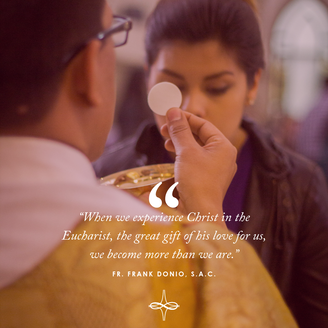
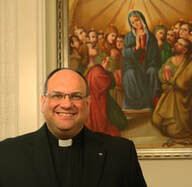
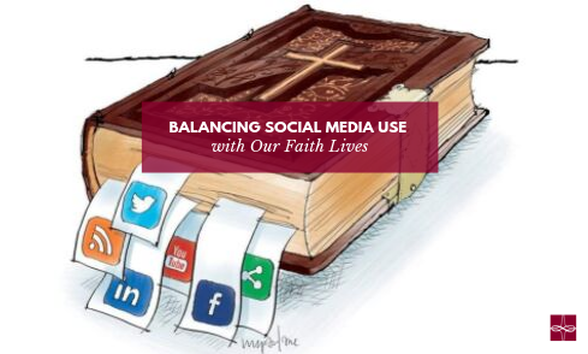

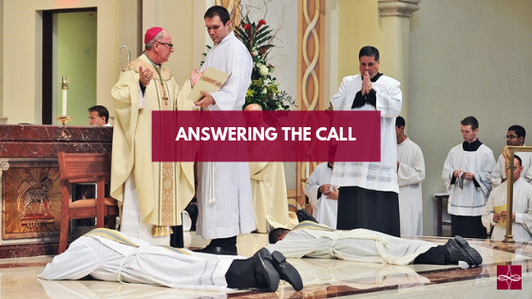

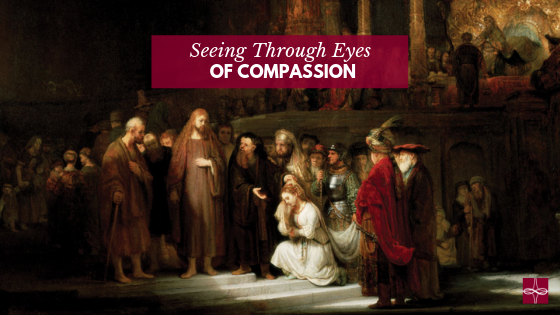

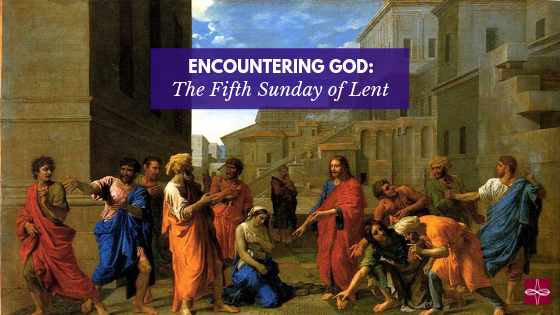

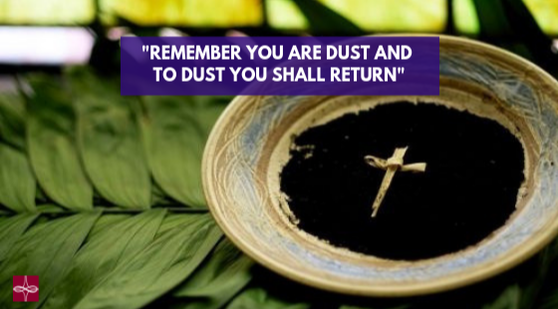

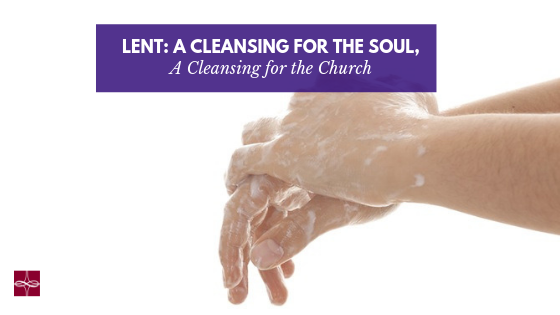

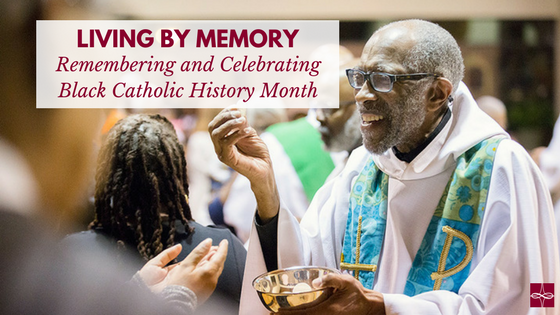

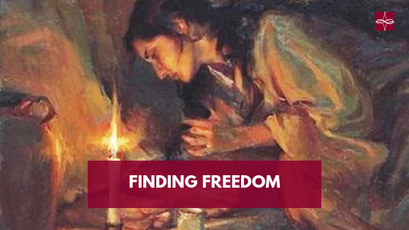

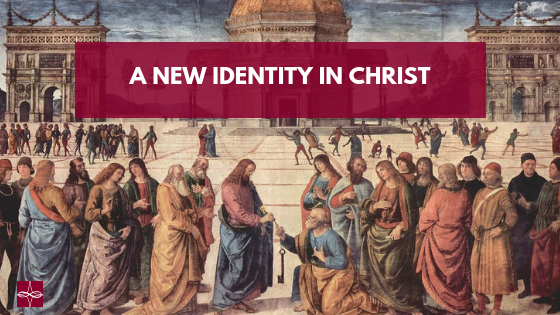

 RSS Feed
RSS Feed